Arrested Decay

The dirt road crests the hill and there it is - Bodie, California's most famous ghost town, preserved in a state of arrested decay. From 1859 to the early 1900s, this gold rush boomtown swelled to nearly 10,000 souls chasing fortune in the Sierra Nevada hills. Sixty-five saloons. One church. They came chasing dreams of striking it rich. Now the town stands frozen in time—maintained exactly as it was abandoned. Only the wind and the rats remain, moving through buildings that whisper a question I cannot ignore: What about my dreams? What about the treasures I have been storing? Jesus' warning echoes through these empty rooms:
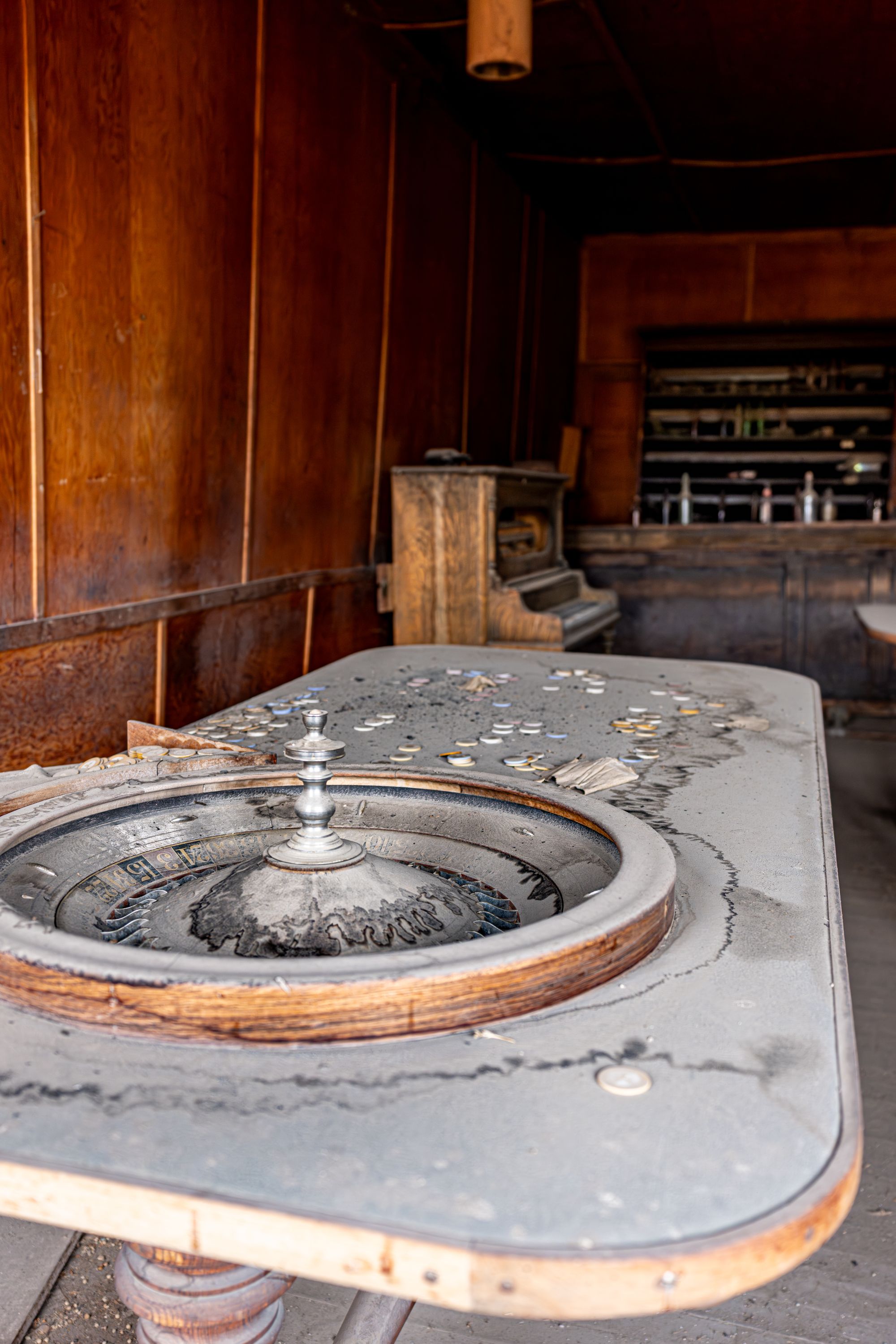
"Do not store up for yourselves treasures on earth, where moths and vermin destroy, and where thieves break in and steal. But store up for yourselves treasures in heaven, where moths and vermin do not destroy, and where thieves do not break in and steal." - Matthew 6:19-20
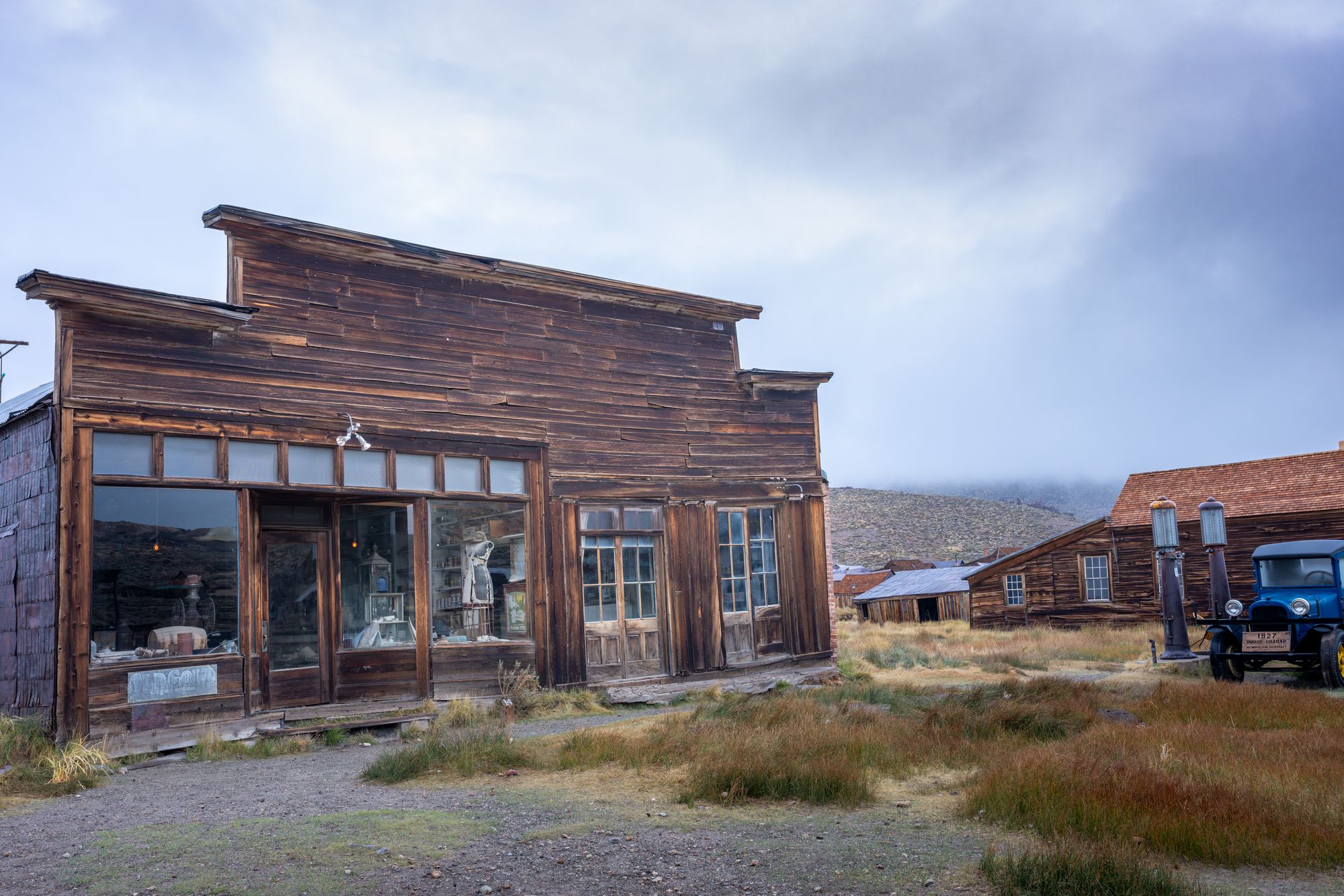
The park ranger provided me special permission to enter buildings that most visitors can only peer into through dusty windows and doorways. It is early morning, before the park opens to the public. The general store is the first building they let me enter, and I was not prepared for what I would find there when I stepped inside.
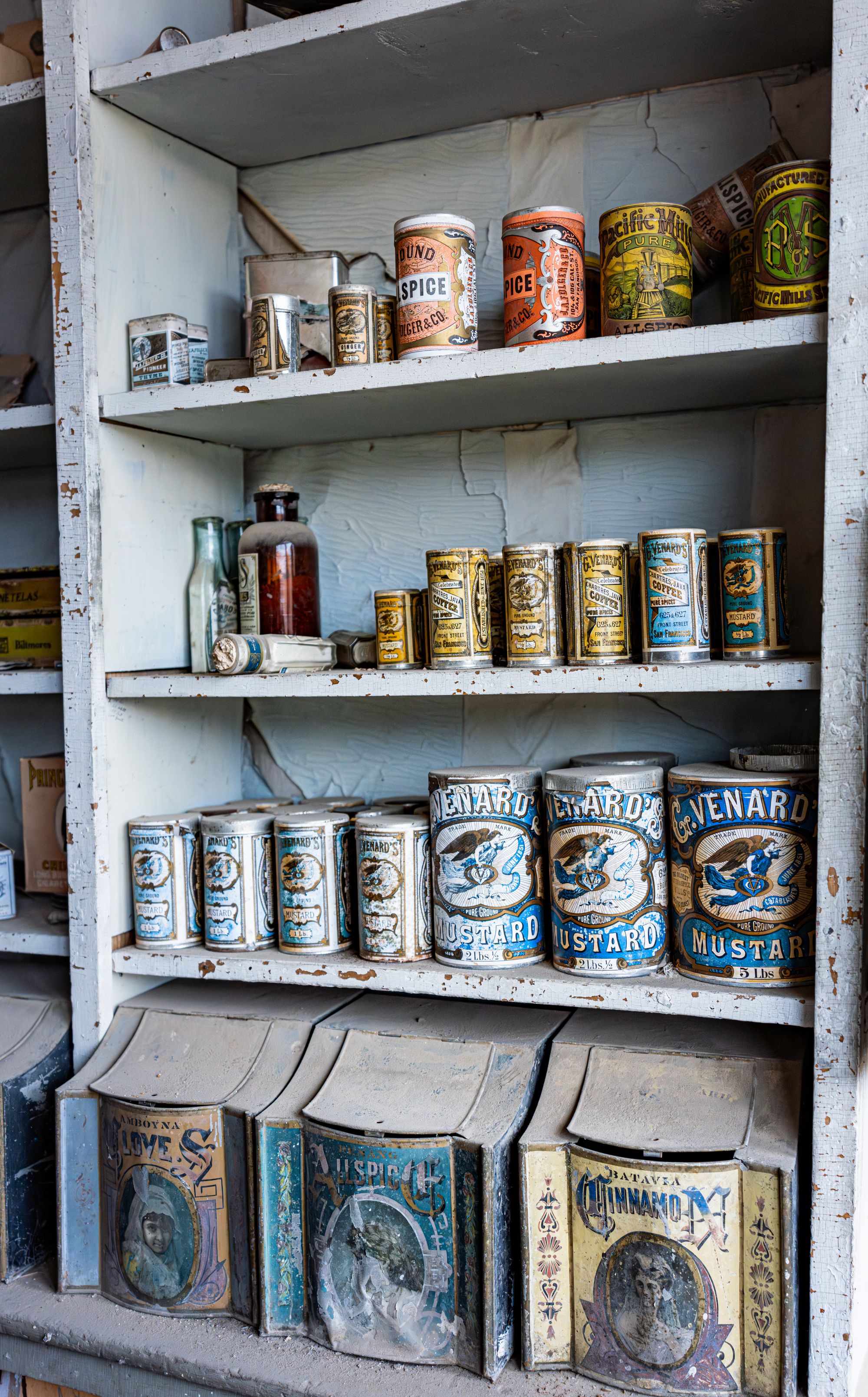
Canned goods still lined the shelves in perfect rows - labels faded but orderly, as if the shopkeeper had just stepped out for lunch and would return any moment to dust them off. I stood by the counter where transactions once happened, then looked down. Behind it, hidden from the casual view through windows, lay the evidence of some long-ago earthquake: bottles, jars, merchandise that had tumbled from their displays and simply... stayed there. For decades.
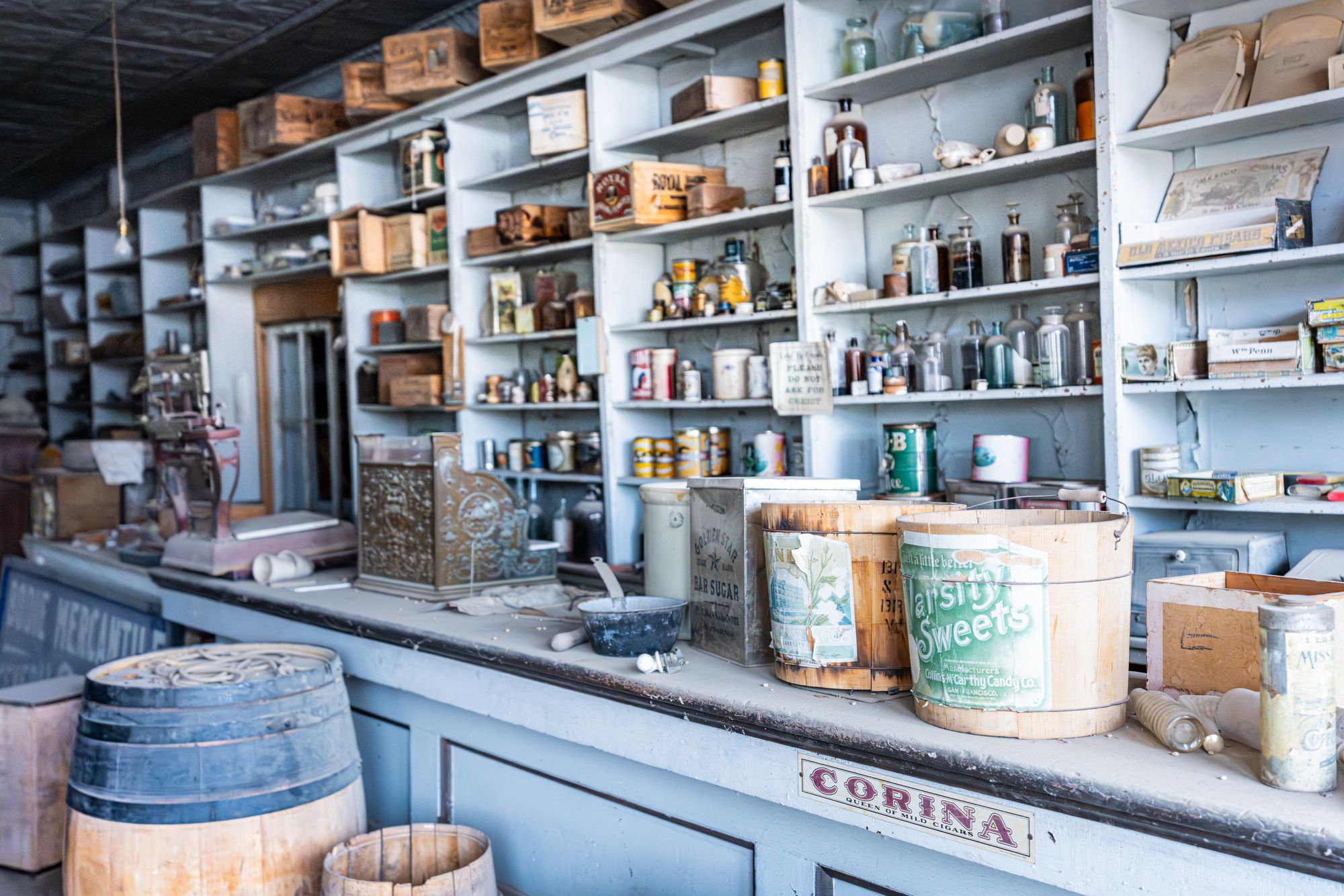
I stood staring at the choice someone had made after this became a ghost town. Clean up the mess, or leave it exactly as it fell? They had chosen preservation over restoration. Arrested decay over the hard work of rebuilding. And I recognized that choice with a jolt that took my breath away.
I have had those earthquakes. We all have. Moments when life shook everything I thought I had neatly arranged and sent it crashing to the floor. The loss of home, possessions, friends. Betrayal from people I loved most. Dreams that shattered when the ground beneath them shifted without warning.
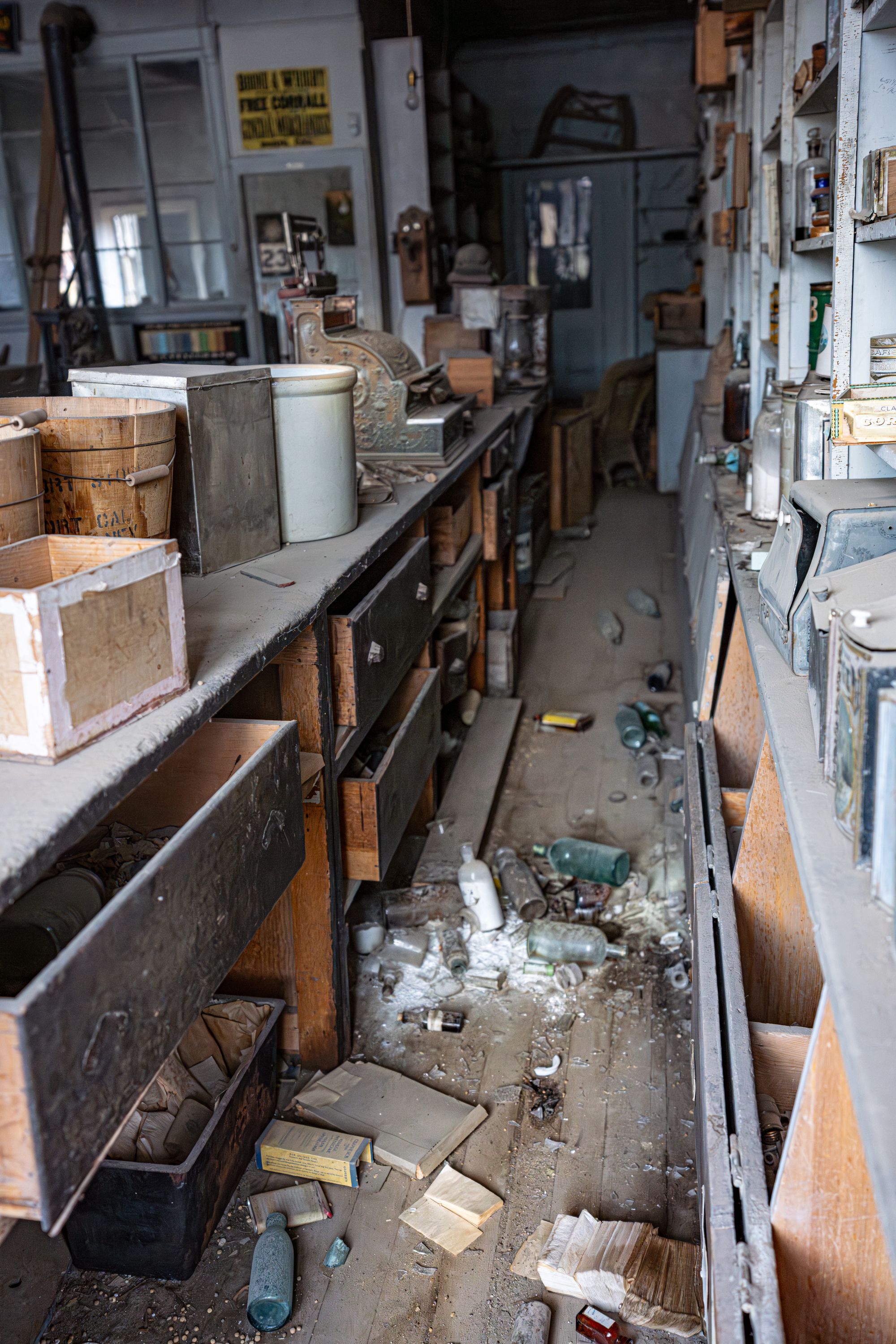
Standing in that abandoned store, I realized I could have made the same choice as whoever walked away from this mess. I could have built a monument to my damage, preserved my brokenness exactly as it fell, and spent the rest of my life carefully stepping around the pieces. God knows the world wanted me to. There is something almost sacred about victimhood in our culture - we are encouraged to hold onto our wounds, to build our identity around our damage, to stay frozen in the moment everything fell apart. For years, I tried to preserve my own brokenness like a hallowed relic. How much of my story became about what happened TO me instead of what God was doing IN me? The voices were constant, relentless: "You have every right to be bitter. Look what was done to you. You'd be crazy to trust again, to hope again, to build again."
But God's whisper was different, quieter, persistent:
“I [God] have plans for you. Plans to prosper you and not to harm you, plans to give you hope and a future." Jeremiah 29:11
I had learned something those voices didn't understand: God's blueprint for restoration doesn't look like my careful arrangements. Where I saw irreplaceable loss, He saw space for something better. Where I saw betrayal, He saw the removal of what was never meant to stay. Where I saw endings, He saw beginnings I couldn't yet imagine. It wasn't immediate or easy. Some pieces were too broken to save. Others could be put back together, though they'd never look the same. The hardest part was fighting not just my own desire to stay broken, but the world's insistence that I should. But staring at those bottles and jars that had been lying on that floor for decades, I recognized I had made a different choice - I had let God clean up my earthquake damage. I could almost hear the ancient promise echoing in that dusty silence:
“I [God] will restore to you the years that the swarming locust has eaten." - Joel 2:25
Room after room, building after building, the pattern repeated. The ranger had warned me not to disturb anything, not even to brush away the dust. This place was preserved in its decay, maintained in its brokenness. Worst of all, the hope of life had been reduced to nothing more than dust.
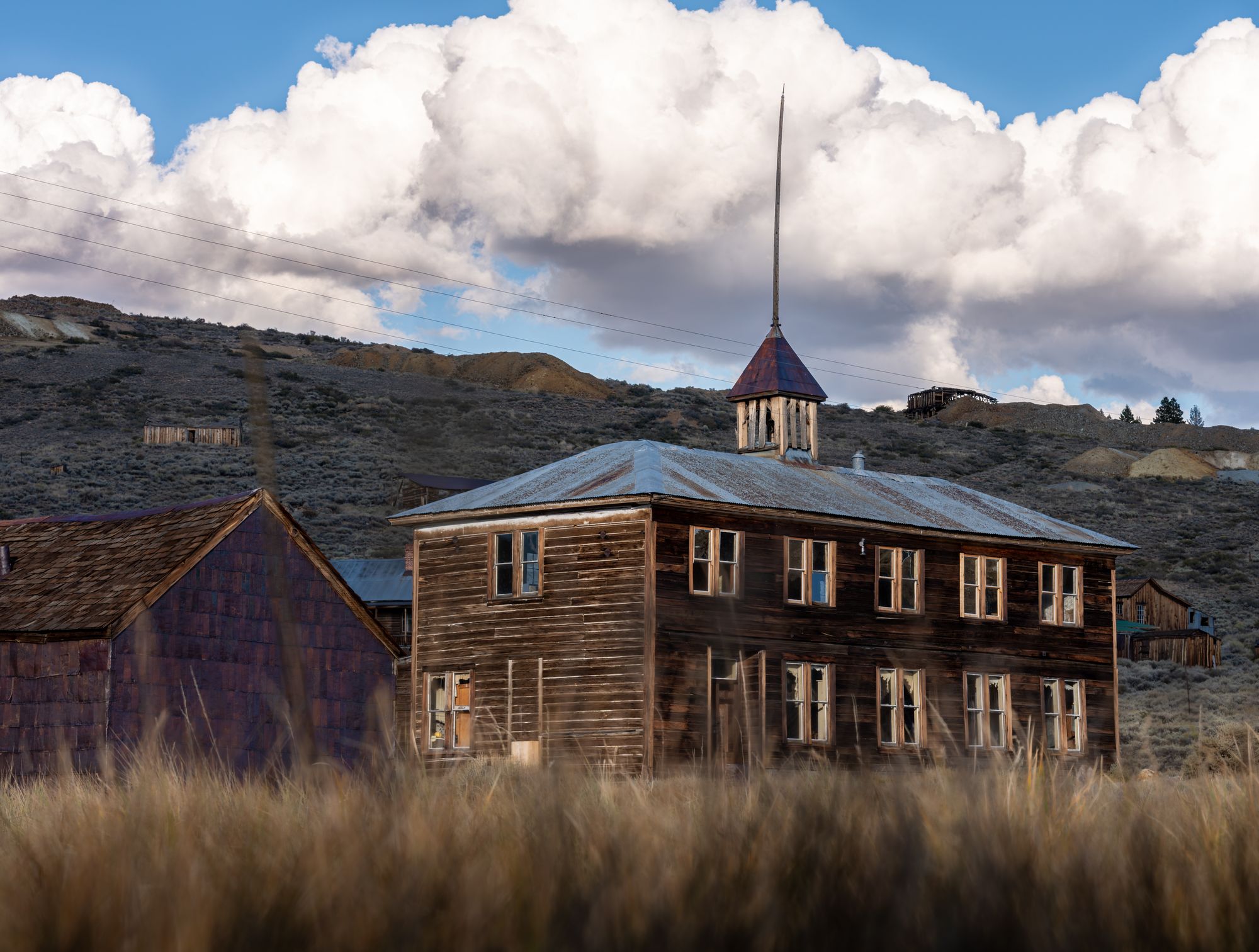
In the schoolhouse, I found something different - order. Desks lined up in rows, books resting on each one.
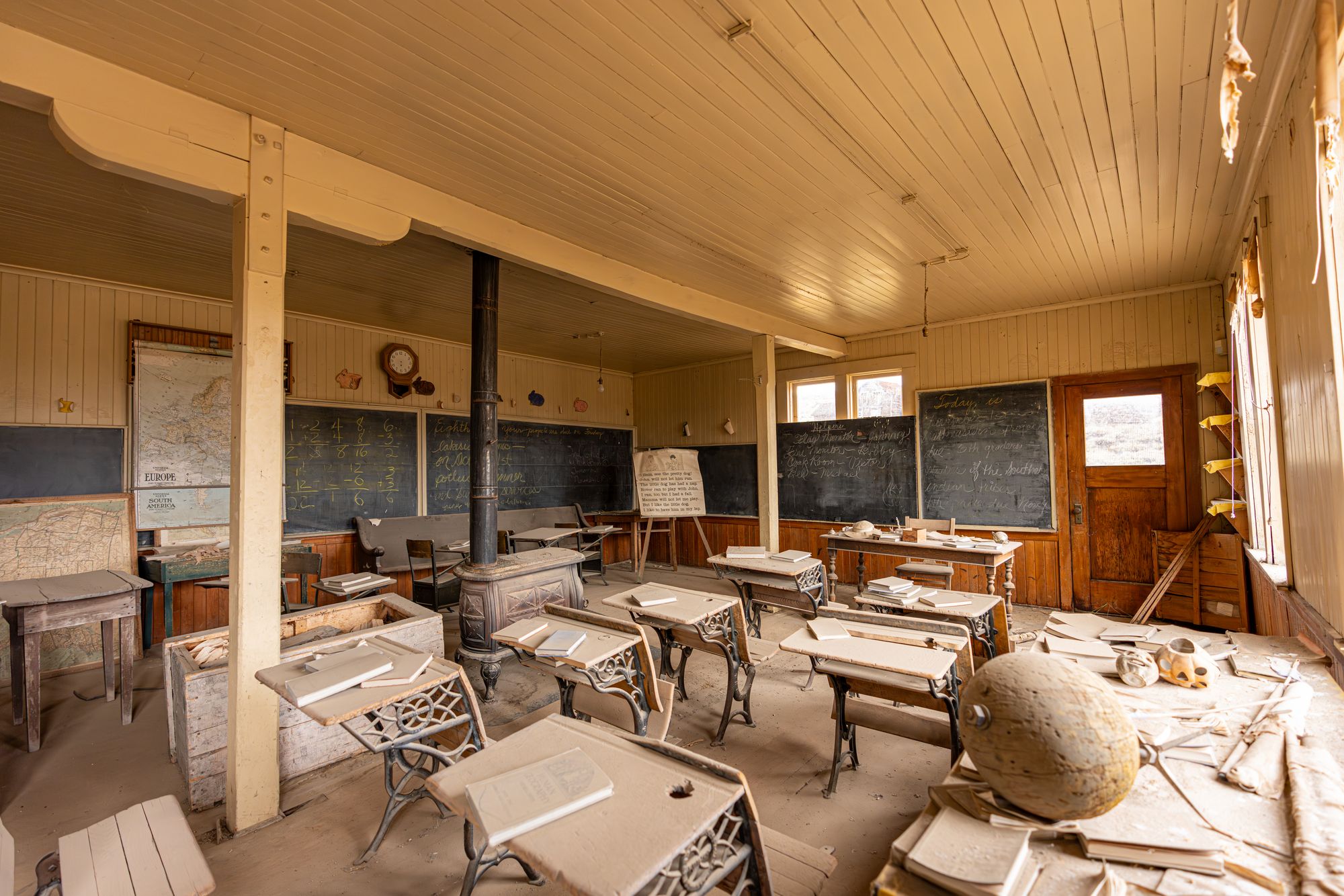
I leaned close, straining to read the titles through the dust and shadows. Advanced Arithmetic on one desk. And beside it, a paperback with curled pages - A Christmas Carol. I stood there, stunned by the irony. Here I was, standing in a ghost town, looking at a book about a man visited by ghosts sent to teach him the very lessons this town had failed to learn. Scrooge hoarded gold and nearly lost everything that mattered. He was given a chance to see what his choices were costing him - and he changed. But Bodie? A town full of people chasing the same earthly treasure, building the same monuments to gain, and they became the very ghosts they had been warned about.
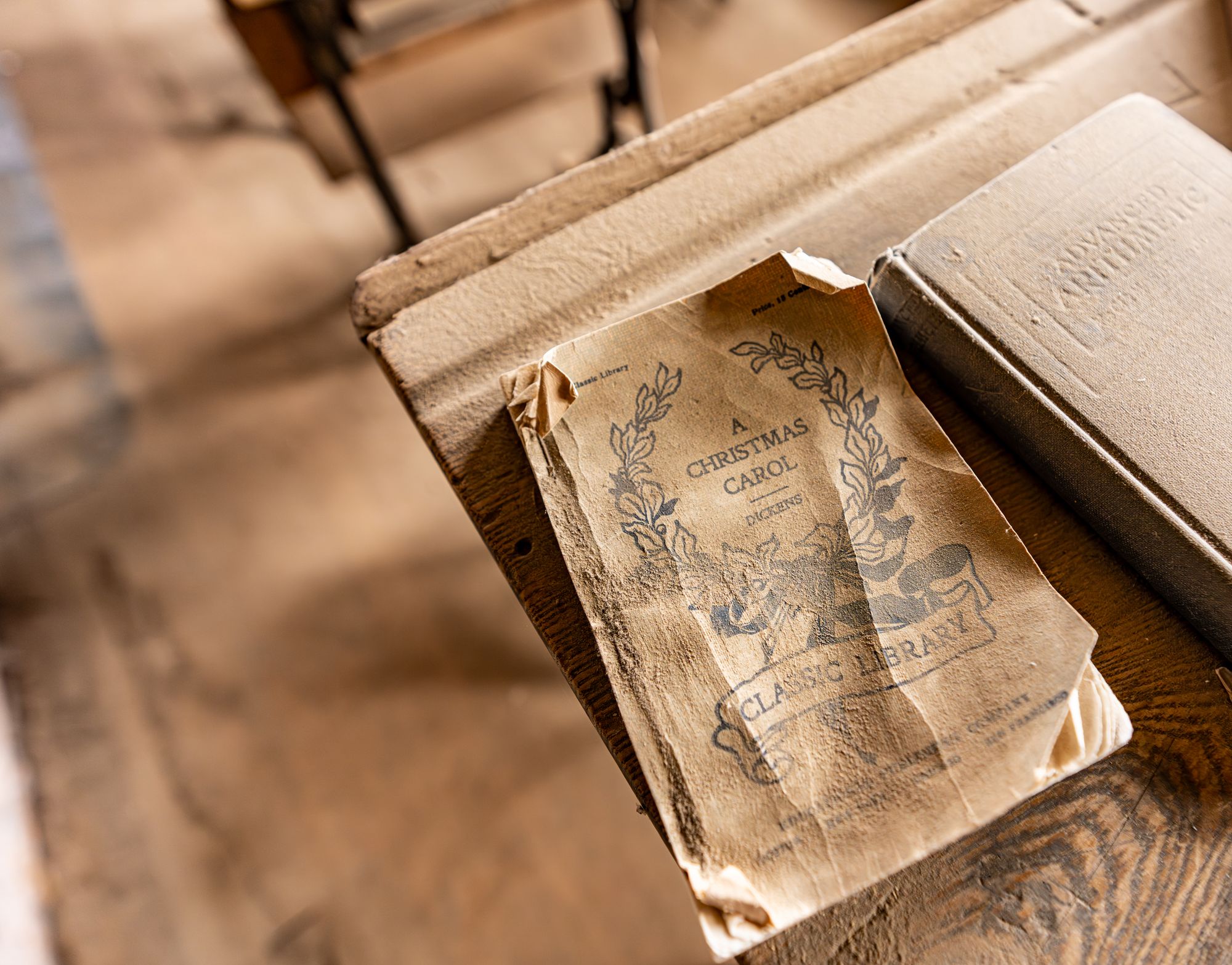
The mortuary was where this truth hit even harder. Small coffins lined the walls and floor - some heartbreakingly tiny. Even in a town chasing fortune, the most precious treasures could not be protected from loss.
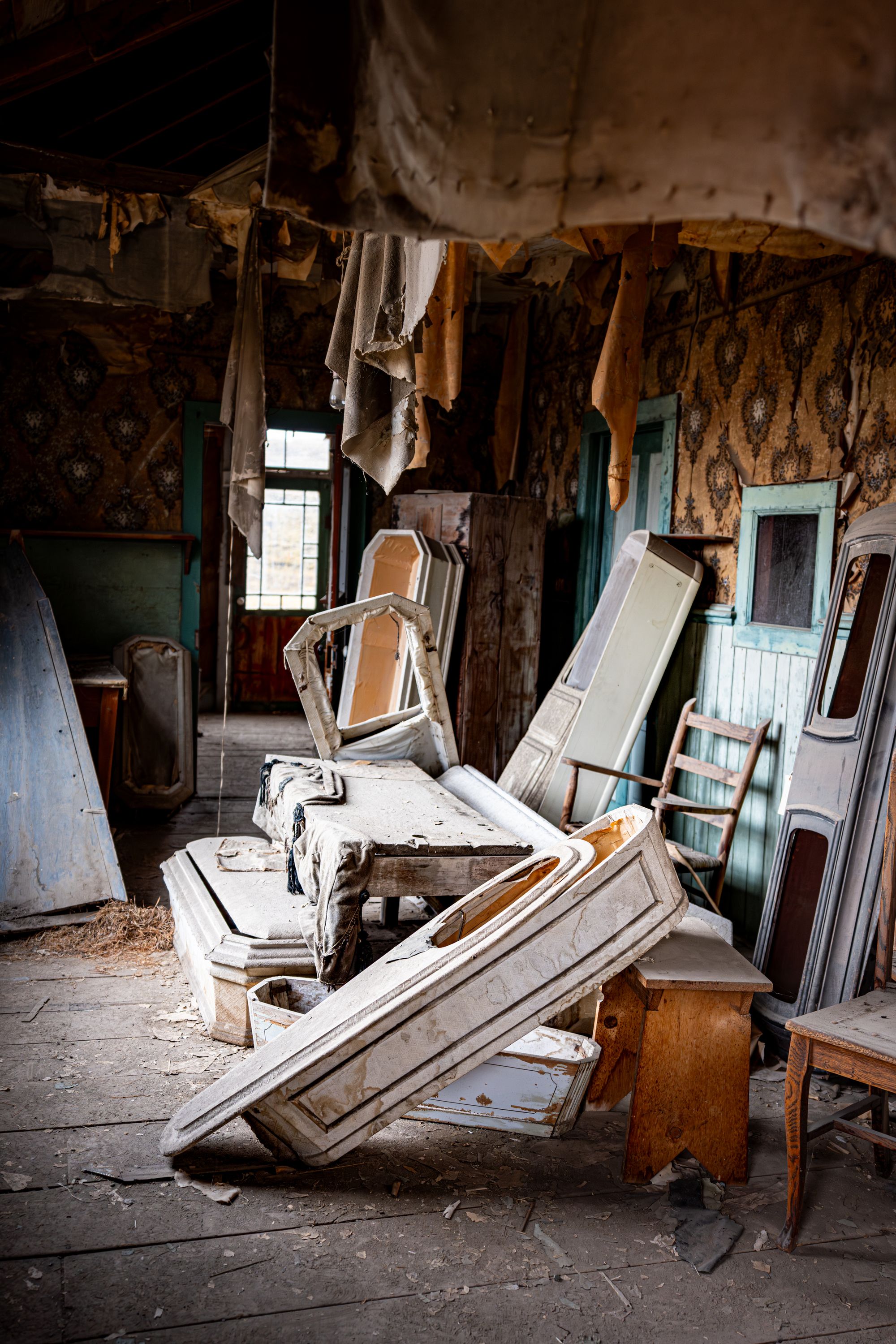
But here is what struck me: these were empty monuments to grief that never moved toward hope. Death preserved but not transformed. I have buried dreams too - relationships, opportunities, versions of myself that didn't survive. But there is a difference between honoring what was lost and building a shrine to staying lost. God does not waste our pain, but He does not want us to worship it either. The church should have been where this town learned that truth.
When I finally entered it, I found the church was the best-preserved building in town. Empty pews, perfect and untouched. I stood there wondering: Was this because it was built better, or used less? I'll never know. But I do know Bodie had sixty-five saloons and one church. The math tells a story even if the details don't.
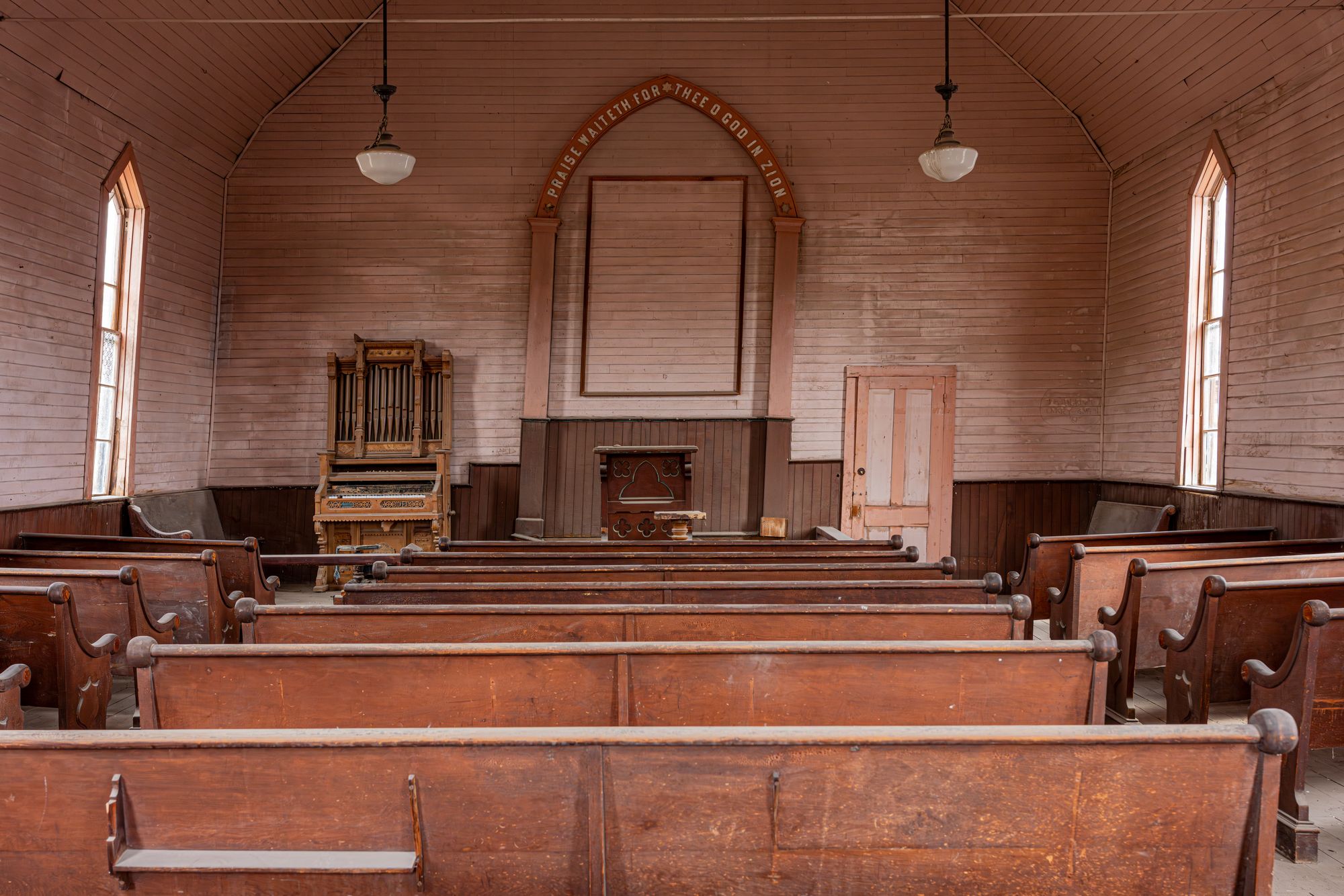
I stood in the back of that sanctuary, careful not to disturb even the dust on those wooden pews, and wondered; how many people had filled these seats on Sundays? Some must have come, surely. But were they there to hear God's still voice, or simply because that is what you are supposed to do on Sundays?
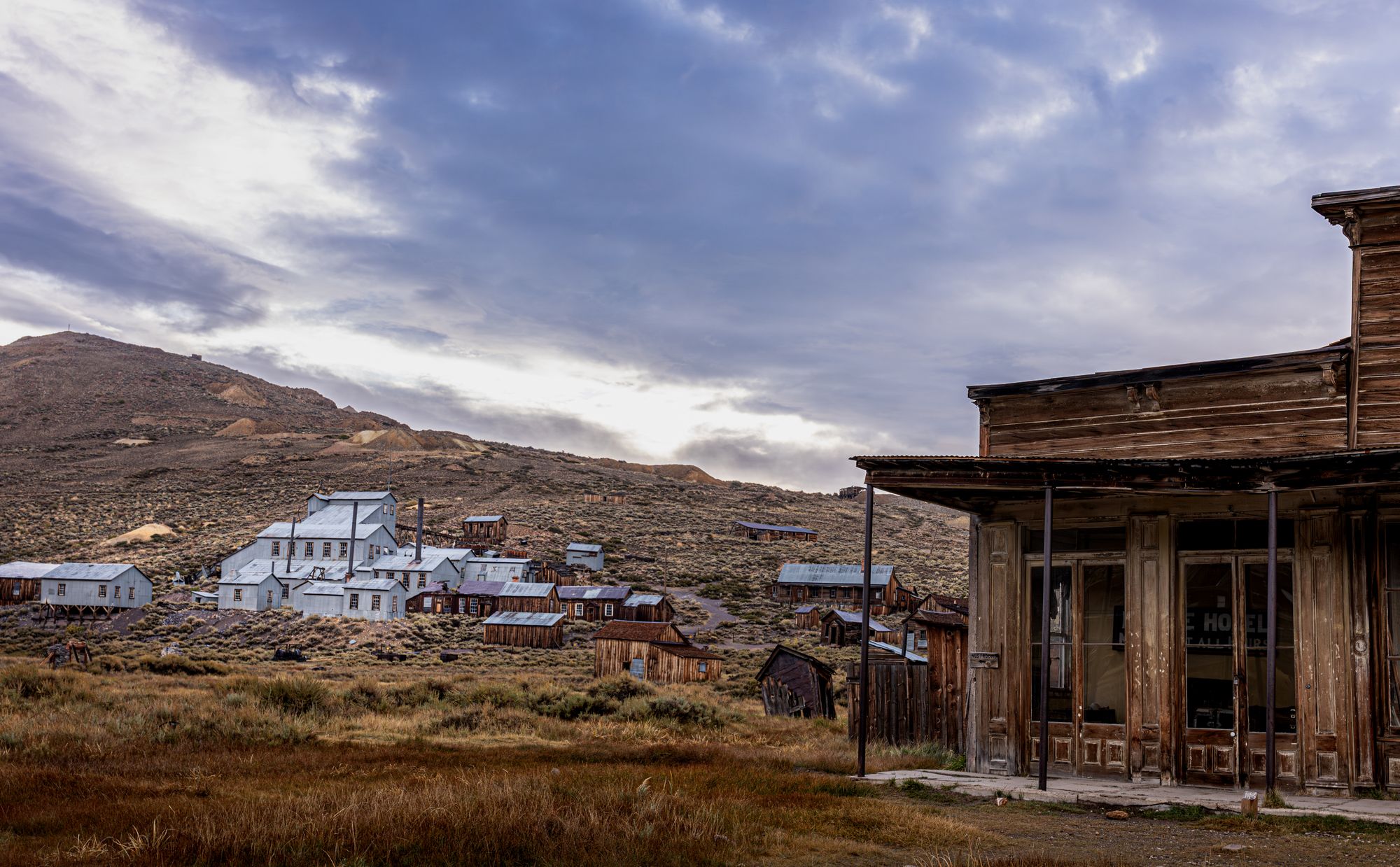
They say the stamp mill ran six days a week, pounding gold from rock - so loud it became white noise. Babies slept through it. But on Sundays, when it finally stopped, all the babies would cry. A new generation disturbed by silence - the one thing necessary to hear God. The people of Bodie chose noise instead. Sixty-five saloons full of it, one quiet church where they might actually have to hear truth.
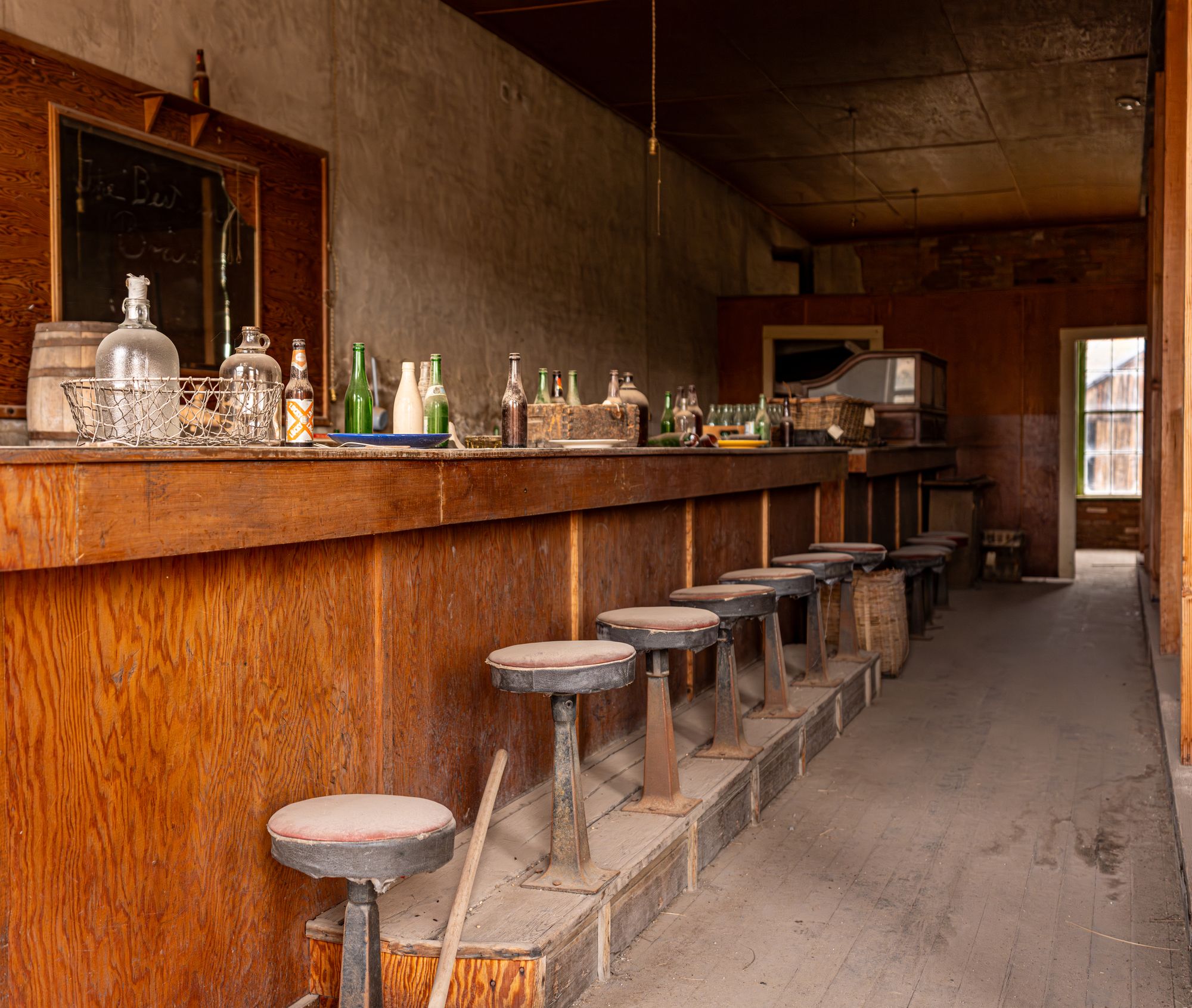
They were all seeking the same thing, really - freedom from whatever they had left behind, hope for something better than what they had known. But they were looking down, digging deeper, pounding harder, when what they needed was above them all along. How many times had I made the same mistake? Trying to pound meaning from the rubble of my circumstances instead of lifting my eyes to the One who promises to work all things together for good? David understood this choice when he wrote:
"I lift up my eyes to the mountains— where does my help come from? My help comes from the Lord, the Maker of heaven and earth." - Psalm 121:1-2
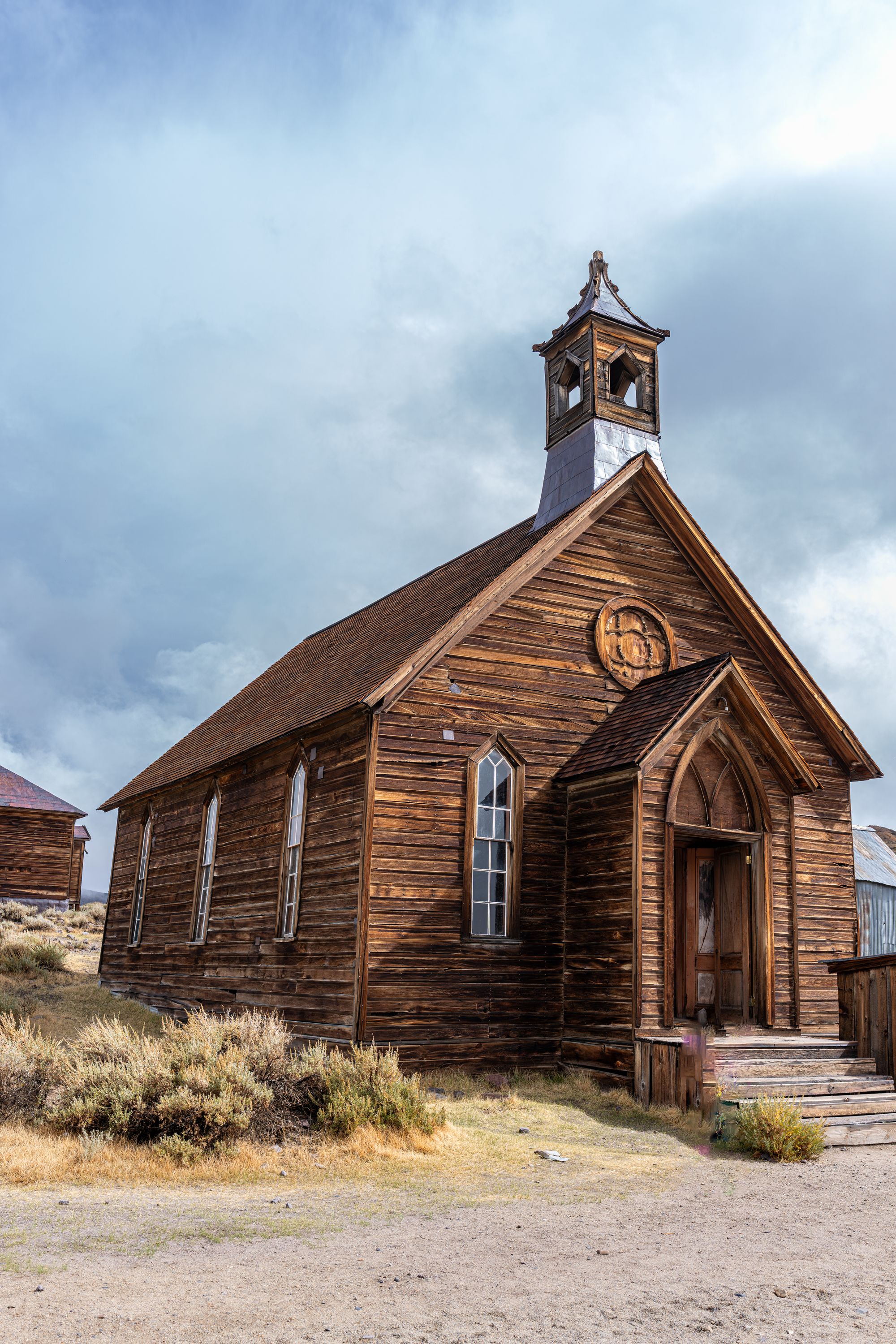
I thought I understood Bodie's lesson. The choice between arrested decay and restoration, between preserving brokenness and trusting God to rebuild. But a few days later, when I returned for the sunset, the ghost town had one more truth to teach me. As the sun began to set, something extraordinary happened. There, in my viewfinder, grace appeared. Light rays from the setting sun burst over the corner of an old building, heaven's glory streaming over the very places where earthly dreams had died.
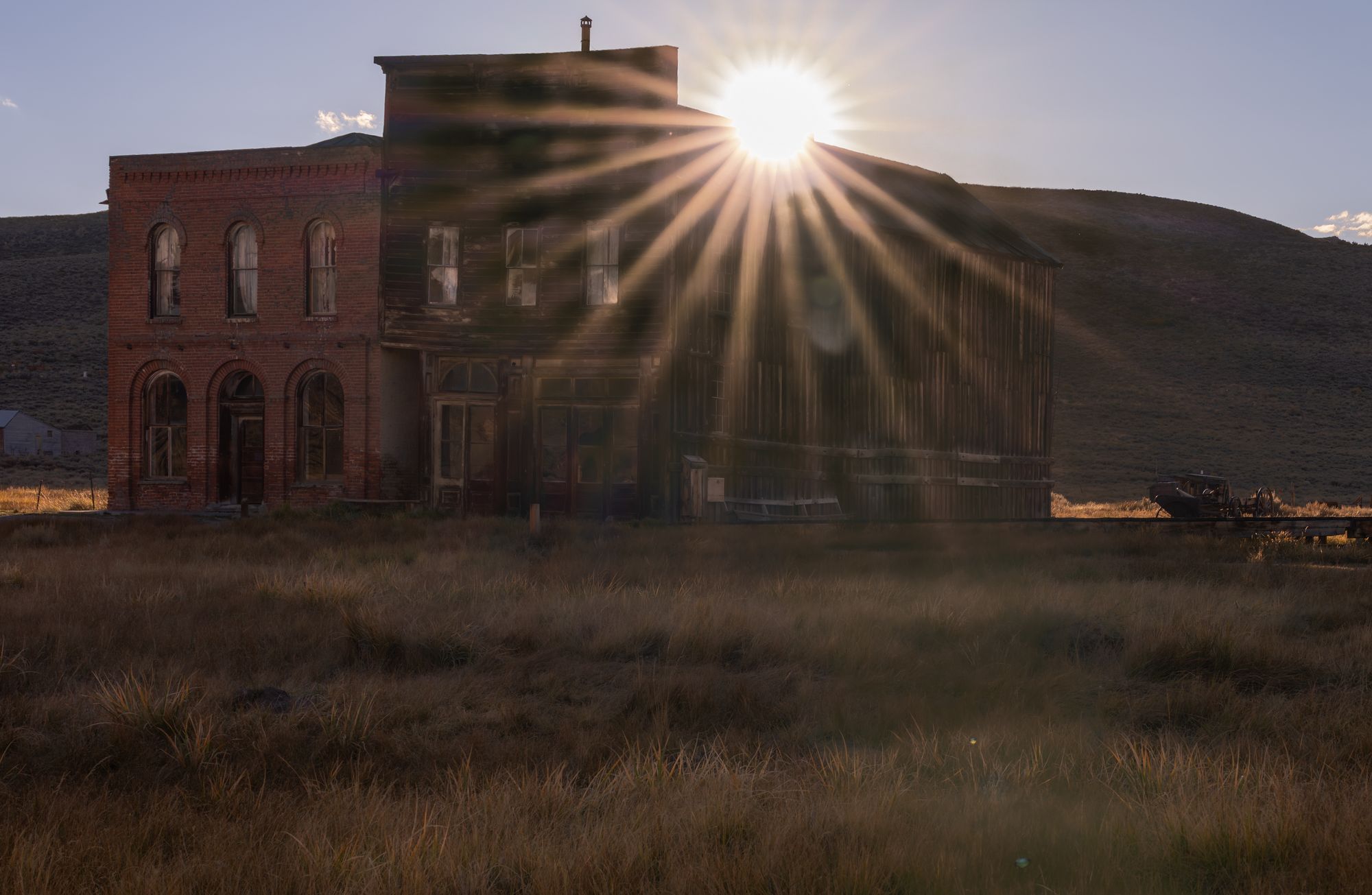
I was granted something rare that evening - access to stay after closing to photograph the night sky. The transition from sunset to darkness felt like walking from one world into another. As the light faded and cold settled in, the sounds began in earnest. Scratching. Squealing. The unmistakable noise of creatures fighting over territory in buildings where human dreams had died. The rats were not just surviving in these abandoned spaces - they were thriving, multiplying, claiming dominion over what had once sheltered hope.
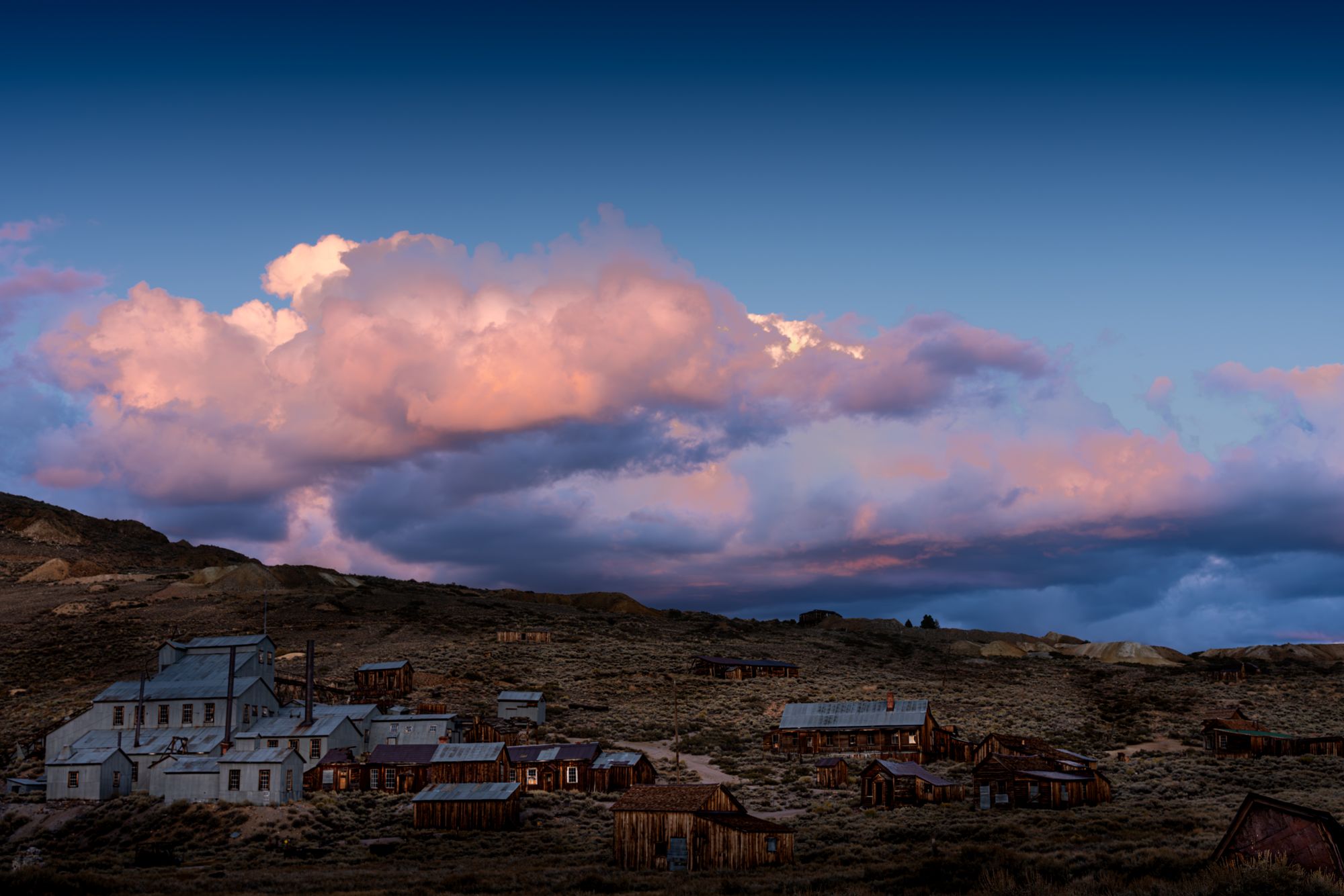
As the squealing grew louder in the darkness, I found myself hoping the rats would stay in the buildings instead of joining me in the darkness. But that is what we always hope, isn't it? That the things feeding on our abandoned spaces will stay hidden, contained, out of sight. But in the stillness and darkness, you cannot avoid hearing them anymore. What grows in the places we abandon to arrested decay? What multiplies in the rooms we lock but never clean? We think we are preserving something by leaving it untouched. But nature abhors a vacuum. Something always moves in. Something always claims the territory we refuse to reclaim.
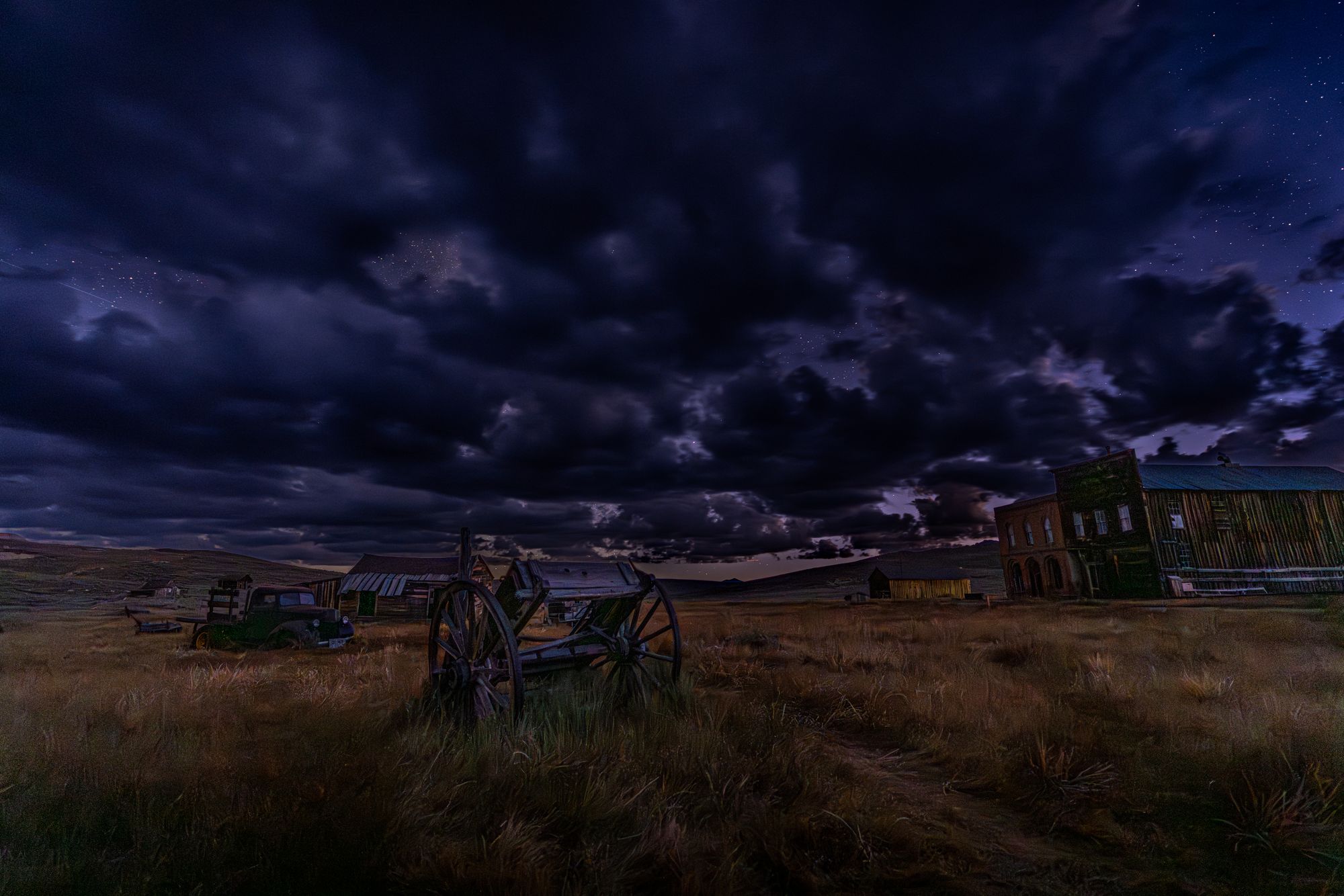
Then I looked up. The clouds had moved in, blocking the stars I had come to photograph. Time seemed to stop. Or maybe it just slowed to the agonizing pace that darkness always imposes. I kept looking up, searching for any hint that change was coming. At one point, the clouds grew thicker - worse before better. But I had seen a break, just for a moment. I knew it could happen. So I stayed. Determined not to leave until the change came through.
And then the clouds broke open.

The Milky Way blazed overhead - the same stars that had shone over Bodie's busiest days, the same stars that watched it die. They had been there all along. Faithful. Unchanged. Waiting for me to see what had never stopped being true. The stamp mill that dominated the landscape during the day was now dwarfed by infinity. The psalmist knew this perspective:
"The heavens declare the glory of God; the skies proclaim the work of His hands." - Psalm 19:1
This is what faith looks like in our darkest hours. Not the absence of darkness, but the choice to keep looking up even when time crawls and the clouds grow thicker. Not blind optimism, but determined trust - I saw it could happen, so I am not leaving until it does. The rats were still squealing. The cold was still biting. But above it all, faithful and blazing, the light I had been waiting for broke through.
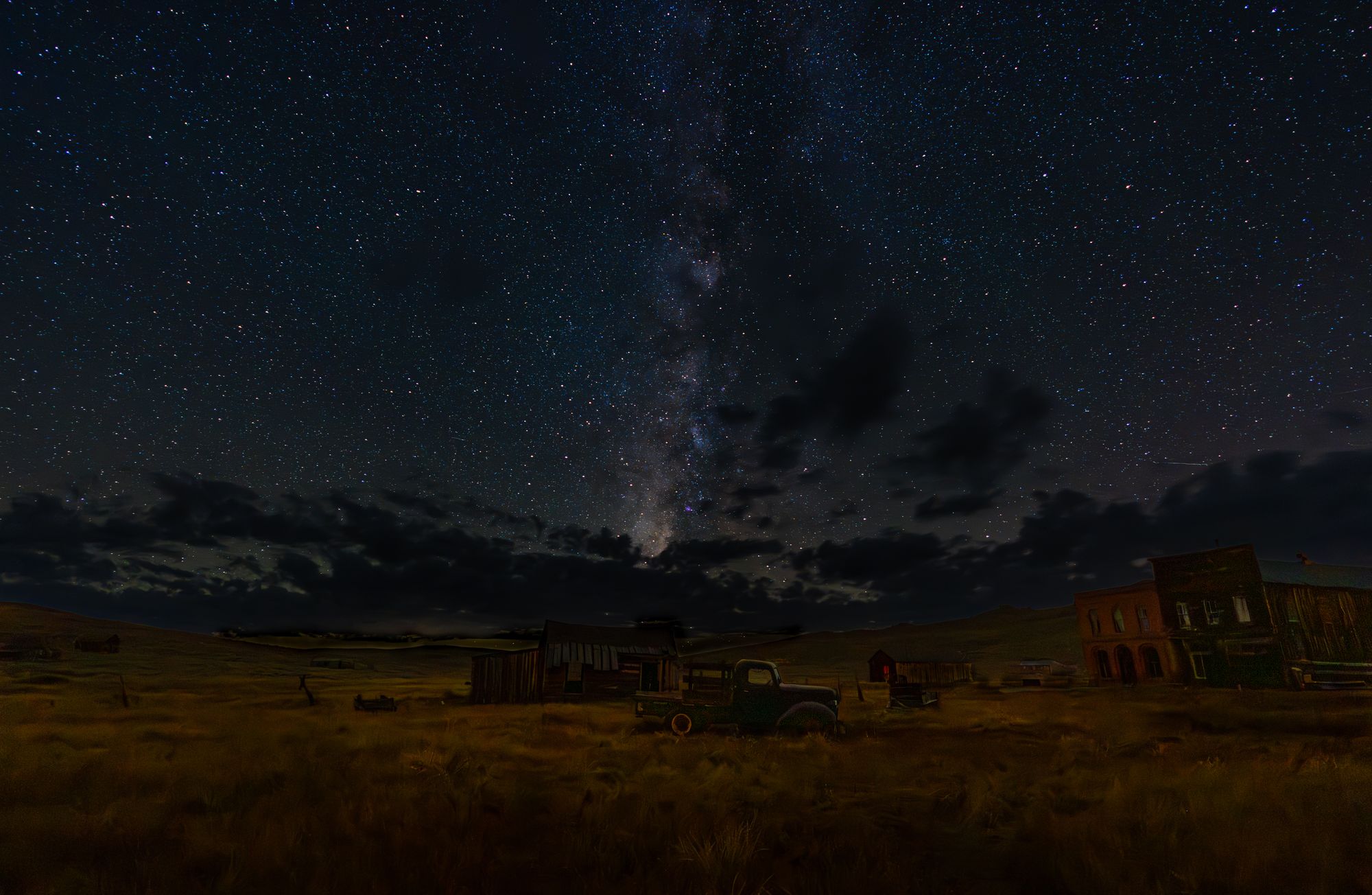
Standing under that eternal sky, I understood Bodie's seduction. There is something almost comfortable about staying broken, about building your identity around your damage, about letting your earthquakes define you. They chose arrested decay. I have been tempted by that same choice.
But the rats were still squealing in those preserved buildings. The cold was still biting. And above it all, faithful and blazing, the stars that had watched Bodie rise and fall were still shining—unchanged, waiting for anyone willing to look up.
God's ways are higher than ours. The stamp mill that dominated this landscape now lies dwarfed by infinity. Where we see endings, God sees beginnings. Where we see irreparable damage, He sees space for something new. Where we preserve our brokenness like a sacred relic, God offers restoration.
So I'm asking you: What earthquakes are you preserving? What broken pieces are you carefully stepping around instead of letting God rebuild? What rooms in your heart have you locked and abandoned, letting the rats claim territory that was meant for hope?
The choice is yours, every day: arrested decay or abundant life. Even in your darkest hour, even when clouds hide what you're desperate to see—His light is there. Faithful. Waiting.
I have walked both paths. I choose life.
“I [Jesus] have come that they may have life, and have it abundantly.”- John 10:10
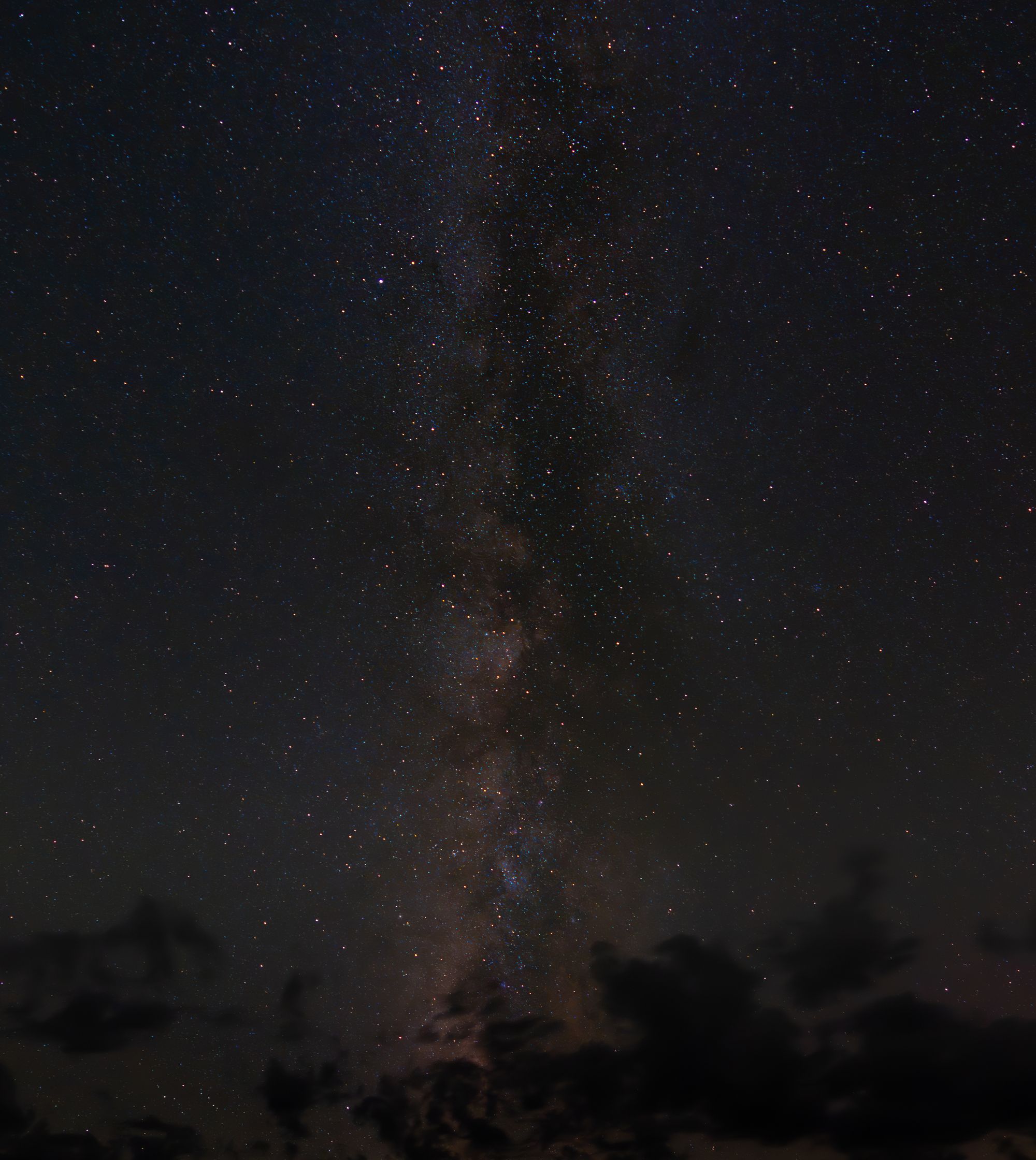
The stars are still shining over your earthquakes. The invitation is still open.
Will you look up?
